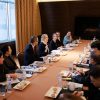Comment by Alyona Getmanchuk for “Foreign Policy“.

Ukrainian President Volodymyr Zelensky looks on during a joint press conference with Sweden’s Prime Minister following their talks in Kiev on December 4, 2019. (Photo by Sergei SUPINSKY / AFP) (Photo by SERGEI SUPINSKY/AFP via Getty Images)
Volodymyr Zelensky is walking a fine line as he seeks peace with Russia without being seen as ceding too much in return.
While Washington has been fixated on U.S. President Donald Trump’s interactions with his Ukrainian counterpart—and whether those conversations represent an impeachable offense for the American leader—Ukrainian President Volodymyr Zelensky has been focused on ending the war in his country’s east, where more than 13,000 people have been killed in a five-year-long battle against Russian-backed separatists.
Now Zelensky finds himself somewhat hobbled by the impeachment controversy back in Washington as he prepares to hold his first-ever meeting with Russian President Vladimir Putin in Paris on Monday. There, the leaders of Ukraine, Russia, Germany, and France, collectively known as the Normandy group, will meet together for the first time in three years to discuss ways to resolve the conflict.
The talks are not expected to yield any breakthroughs, but the stakes could hardly be higher for Ukraine’s neophyte president as he contends with a distracted Washington and a stubborn Moscow—as well as a French president who has sought rapprochement with Putin.
While the United States doesn’t have a formal seat at the table in the Normandy format talks, Washington played a crucial role behind the scenes coordinating between the key players, a job some fear may be undermined by the resignation of Kurt Volker, who served as U.S. special envoy to the peace process. Some of the diplomats involved, including Volker, have either stepped down or been sidelined as a result of the hyperpartisan impeachment hearings.
“Without the U.S. to rally everyone and get everyone on the same page, and make sure the French don’t go astray, it sets up a pretty difficult environment for the Ukrainians,” said Alina Polyakova, the director of the Project on Global Democracy and Emerging Technology at the Brookings Institution.
Since he was sworn in as president in May, Zelensky has attempted to prove that he intends to make good on campaign promises of peace by negotiating a prisoner exchange with Russia and reaching an agreement with separatists to a mutual withdrawal from key points along the front line. Even as he pushes forward on a raft of anti-corruption reform efforts, Ukrainian voters see an end to the war as a make-or-break issue for Zelensky.
A September poll conducted by the National Democratic Institute, a Washington-based nonprofit organization, found that a majority of Ukrainians—52 percent—see resolving the conflict in eastern Ukraine as the most important national issue.
Putin has shown a willingness to cooperate with the new Ukrainian leader. But some experts say it’s not out of the kindness of his own heart. “[Putin] made those steps principally as a way to point out to Germany and France that he’s not without the ability to at least make some small concessions,” said John Herbst, a former U.S. ambassador to Ukraine. But Moscow is unlikely to give ground on anything that could diminish its leverage over Kyiv.
Some Ukrainians are also pessimistic about the Normandy talks. “Nothing has changed in the position of the Russian Federation, at least for the time being,” Volodymyr Ogrysko, who served as Ukrainian foreign affairs minister from 2007 to 2009, told Foreign Policy.
Zelensky has been realistic about what the summit could achieve. But in a video posted to his Facebook page on Monday, Zelensky said that the meeting itself was a victory for Ukraine. “Some say that it’s impossible to have a dialogue with Putin, but without a dialogue we’re like on a treadmill—we are running forward, but not moving,” he said in the video, which was filmed while he was walking on a treadmill at the gym.
Heading into Monday’s summit in Paris, Zelensky and his camp are walking a fine line between trying to break the long-standing stalemate with the Kremlin and not striking a peace deal seen as too favorable to Moscow, which could stoke domestic backlash from fickle voters impatient for change.
Alyona Getmanchuk, the director of the Kyiv-based think tank New Europe Center, said any potential peace deal seen as ceding too much to Putin will backfire. “He will be careful in making a deal which could probably stop the war, but trigger a conflict inside Ukraine. Any deal which will not be accepted by Ukrainian society will not be sustainable,” she said.
An October agreement to grant partial autonomy in rebel-held regions in eastern Ukraine drew sharp criticism from the public, who saw it as a capitulation. Thousands took to the streets in Kyiv in the largest demonstrations since the 2014 revolution that swept the pro-Russian President Viktor Yanukovych from office.
By November, Zelensky’s approval ratings had fallen to 52 percent from their September high of 73 percent, according to opinion polls from the Kyiv International Institute of Sociology.
Zelensky’s agreement to the so-called Steinmeier formula, devised by former German Foreign Minister Frank-Walter Steinmeier, was a precondition to Monday’s meeting of the Normandy group. Central to the discussion at the peace summit will be the implementation of the so-called Minsk agreements, two peace deals brokered in 2014 and 2015 in the Belarusian capital with French and German mediation.
The Minsk agreements helped curb the worst of the fighting between Ukrainian forces and Russian-backed separatists. But both Moscow and Kyiv accuse each other of failing to follow the terms of the deal, which calls for a restoration of Ukrainian state control over the border with Russia, the withdrawal of heavy weaponry from the conflict zone, and elections in the rebel-held regions.
Central to the dispute is what part of the agreement should come first: Ukraine argues that it needs to regain control of its border before elections, while Russia insists elections should be the first step.
For Moscow, the upcoming talks present an opportunity to feel out Zelensky and test the resolve of the comedian-turned-president at the negotiating table.
“There is no room in Minsk for a win-win solution; someone has to capitulate,” Vladimir Frolov, a Moscow-based foreign affairs analyst and former Russian diplomat, told Foreign Policy, adding that “Putin holds all the cards coming [into] this meeting.”
The Kremlin may also use the upcoming talks as a way to pressure Ukraine to give ground to Russia’s influence in the breakaway regions and undermine its credibility in the eyes of its Western partners, said Tatiana Stanovaya, the founder of the political consultancy R.Politik and a scholar at the Carnegie Moscow Center.
“Moscow wants to show the West that Ukraine is not able to implement its commitments within the Minsk agreements and humiliate Kyiv in the process,” Stanovaya said. “The aim is to show that Russia is willing to move forward, but that it is Ukraine that blocks everything.”
In Washington, the impeachment investigation into whether Trump sought to pressure Zelensky for his own political gain has placed Ukraine at the center of a bitter partisan feud in the United States, further impairing the Ukrainian leader’s negotiating strength going into the Normandy summit.
Volker resigned in September in the wake of revelations that he’d helped set up a meeting between Trump’s lawyer Rudy Giuliani and an aide to the Ukrainian president, and the State Department looks set to scrap the special envoy position altogether.
The State Department insists that U.S. policy on Ukraine hasn’t changed. “The United States reaffirms our unwavering support for Ukraine’s sovereignty and territorial integrity in the lead up to the December 9 Normandy Format Summit,” spokeswoman Morgan Ortagus said in a statement on Nov. 27. “The United States stands with Ukraine as it moves forward with peace negotiations.”
The State Department’s top envoy on Europe, acting Assistant Secretary of State Philip Reeker, and George Kent, the deputy assistant secretary of state for European and Eurasian affairs, traveled to Kyiv this week to reinforce that message ahead of the Normandy talks.
Herbst, the former ambassador to Ukraine, was more optimistic than others that U.S. support for Ukraine would continue unchanged. “We have told Ukraine, you’re not alone,” he said. However, he said he was concerned that the strong bipartisan support Ukraine has enjoyed in Washington could be undermined by the narrative being pushed by the president and his allies that Ukraine sought to interfere in the 2016 presidential election—a claim for which there is scant evidence.
“That narrative could lead to a clear drop in public support for Ukraine,” he said.
Amy Mackinnon is a staff writer at Foreign Policy.
Robbie Gramer is a diplomacy and national security reporter at Foreign Policy.







